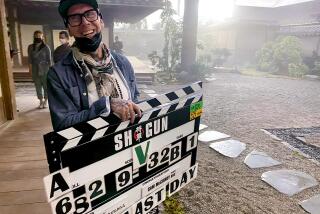MOVIE REVIEW : ‘MacARTHUR’S CHILDREN’: THE STRENGTH TO ENDURE
Masahiro Shinoda’s “MacArthur’s Children” (opening Friday at the Cineplex) begins on V-J Day, Aug. 15, 1945, but it looks back in pride, not shame.
It curses neither those who led Japan into ignominy nor those who conquered her, but rather celebrates the Japanese people in their strength to endure and in their ability to rebuild their lives and their country. It does so with such warmth, humor and pathos that it became Japan’s most popular picture last year. And because we were the conquerors, “MacArthur’s Children” is in some ways our story too.
In filming Yu Aku’s novel, which was adapted by Tsutomu Tamura, Shinoda wanted to capture the collective Japanese spirit at a final moment of purity as it responded bravely to a catastrophe unprecedented in scale and impact and which would leave nothing unchanged.
Set in a small, idyllic island community on the inland sea far from devastated Tokyo (and A-bombed Hiroshima and Nagasaki), “MacArthur’s Children” focuses first on two boys (Takaya Yamauchi, Yoshiyuki Omori) and their playmates who are perhaps more shocked by the Emperor’s speech of surrender than their elders, yet, in their youth and innocence, are really blessed with more resilience and adaptability. It’s hard to recall a film with more affection for youngsters since Truffaut’s “Small Change.”
“MacArthur’s Children,” however, illuminates the lives of various adults as well as those of Yamauchi and Masaki and their friends. In the classroom the boys’ demure teacher (Masako Natsume), whose husband has been declared missing in action, calmly instills pride in her pupils in the face of defeat. However, at home she must cope with increasing pressure from her in-laws to marry her wastrel brother-in-law. There’s also an earthy female barber, a war widow (Shima Awashita) eager to cash in on the newly arrived GIs by opening a gaudy little nightclub.
The film’s most indelible presence belongs to a sweet, quiet girl (Shiori Sakura) who arrives at the village with her father, an admiral (Jyuzo Itami), who has come “to cleanse his soul in natural surroundings” as he awaits certain arrest as a war criminal. The dignified way in which Sakura, on the brink of womanhood, conducts herself in the face of impending personal tragedy makes her an heroine in the truest sense. No self-dramatizing martyr, she allows herself to become a part of the community that so eagerly embraces her.
Shinoda reveals rather than judges. The arriving GIs aren’t portrayed as the hated conquerors but as ordinary American guys whose greatest menace to the quality of Japanese life is the insidious American pop culture they bring along with them. (It’s not for nothing that Glenn Miller’s “In the Mood,” the film’s theme, drowns out a traditional Japanese song at the beginning of the picture.) By the same token, for all the compassion extended to Itami, there’s no skirting the point that there are grounds for trying him as a war criminal.
“MacArthur’s Children” doesn’t cling to a vanished past; it acknowledges that change can be for the good. For example, the plight Natsume finds herself in with her in-laws would be insupportable in today’s era of women’s liberation. And what America represents is by no means all negative. The film deplores a crass copying of American fads and mores, but Natsume herself sees that baseball, played with homemade equipment, has its virtues for her pupils, who eventually take on a Yankee team.
Ironically, the film has a breeziness and bounce that’s actually quite American in itself, and it marks a decided departure for Shinoda, celebrated for such stylized fables as “Double Suicide” and “Demon Pond.” It is a film of wonderful moments, some funny, some sad, all of them affecting.
With its clean look and spare score, “MacArthur’s Children” (rated an appropriate PG) is by far Masahiro Shinoda’s most accessible and ingratiating film. This, his most popular film, may also just happen to be his best too.
‘MacARTHUR’S CHILDREN’ An Orion Classics release of a You-No-Kai production. Producer Masato Hara. Director Masahiro Shinoda. Screenplay Takeshi Tamura; based on the novel by Yu Aku. Camera Kazuo Miyagawa. Production designer Yoshinobu Nishioka. Music Shinichiro Ikebe. Film editor Sachiko Yamaji. With Takaya Yamauchi, Yoshiyuki Omori, Shiori Sakura, Masako Natsume, Taketoshi Naito, Shima Awashita, Ken Watanabe, Shuji Otaki, Haruko Kato. In Japanese, with English subtitles.
Running time: 2 hours, 3 minutes.
MPAA-rated: PG (some parental guidance advised).
More to Read
Only good movies
Get the Indie Focus newsletter, Mark Olsen's weekly guide to the world of cinema.
You may occasionally receive promotional content from the Los Angeles Times.









